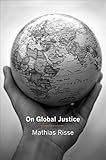On global justice / Mathias Risse.
Material type: TextPublication details: Princeton, N.J. : Princeton University Press, 2012.Description: 1 online resource (xii, 465 pages)Content type:
TextPublication details: Princeton, N.J. : Princeton University Press, 2012.Description: 1 online resource (xii, 465 pages)Content type: - text
- computer
- online resource
- 9781400845507
- 1400845505
- 1283539977
- 9781283539975
- Internationalism
- Distributive justice
- Human rights
- Internationalisme
- Justice distributive
- Droits de l'homme (Droit international)
- internationalism
- LAW -- Essays
- LAW -- General Practice
- LAW -- Jurisprudence
- LAW -- Paralegals & Paralegalism
- LAW -- Practical Guides
- LAW -- Reference
- PHILOSOPHY -- Political
- Distributive justice
- Human rights
- Internationalism
- Menschenrecht
- Verteilungsgerechtigkeit
- Globalisierung
- INTERNATIONALISM
- HUMAN RIGHTS
- INTERNATIONAL COOPERATION
- INTERNATIONAL ORGANIZATION THEORY
- 340/.115 23
- JZ1308 .R57 2012eb
| Item type | Home library | Collection | Call number | Materials specified | Status | Date due | Barcode | |
|---|---|---|---|---|---|---|---|---|
 Electronic-Books
Electronic-Books
|
OPJGU Sonepat- Campus | E-Books EBSCO | Available |
Includes bibliographical references and index.
The grounds of justice -- "Un pouvoir ordinaire": shared membership in a state as a ground of -- Justice -- Internationalism versus statism and globalism: contemporary debates -- What follows from our common humanity? : the institutional stance, human rights, and nonrelationism -- Hugo Grotius revisited : collective ownership of the Earth and global public reason -- "Our sole habitation" : a contemporary approach to collective ownership of the earth -- Toward a contingent derivation of human rights -- Proportionate use : immigration and original ownership of the Earth -- "But the earth abideth for ever" : obligations to future generations -- Climate change and ownership of the atmosphere -- Human rights as membership rights in the global order -- Arguing for human rights : essential pharmaceuticals -- Arguing for human rights : labor rights as human rights -- Justice and trade -- The way we live now -- "Imagine there's no countries" : a reply to John Lennon -- Justice and accountability : the state -- Justice and accountability : the World Trade Organization.
Debates about global justice have traditionally fallen into two camps. Statists believe that principles of justice can only be held among those who share a state. Those who fall outside this realm are merely owed charity. Cosmopolitans, on the other hand, believe that justice applies equally among all human beings. "On Global Justice" shifts the terms of this debate and shows how both views are unsatisfactory. Stressing humanity's collective ownership of the earth, Mathias Risse offers a new theory of global distributive justice - what he calls pluralist internationalism - where in different contexts, different principles of justice apply. Arguing that statists and cosmopolitans seek overarching answers to problems that vary too widely for one single justice relationship, Risse explores who should have how much of what we all need and care about, ranging from income and rights to spaces and resources of the earth. He acknowledges that especially demanding redistributive principles apply among those who share a country, but those who share a country also have obligations of justice to those who do not because of a universal humanity, common political and economic orders, and a linked global trading system. Risse's inquiries about ownership of the earth give insights into immigration, obligations to future generations, and obligations arising from climate change. He considers issues such as fairness in trade, responsibilities of the WTO, intellectual property rights, labor rights, whether there ought to be states at all, and global inequality, and he develops a new foundational theory of human rights.
eBooks on EBSCOhost EBSCO eBook Subscription Academic Collection - Worldwide
There are no comments on this title.

